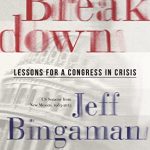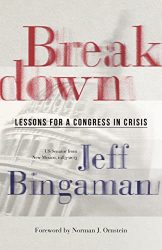Government Crisis Mfg. Co.
A View From The Factory Floor
A View From The Factory Floor
BY Larry Calloway
 In the last half of his 30 years representing New Mexico in the U.S. Senate, Jeff Bingaman saw dysfunction of Congress go tactical and political, beginning in 1995 under then-House Speaker Newt Gingrich and continuing under Mitch McConnell whenever he was Senate majority leader. Both are Republicans. Bingaman is a Democrat.
In the last half of his 30 years representing New Mexico in the U.S. Senate, Jeff Bingaman saw dysfunction of Congress go tactical and political, beginning in 1995 under then-House Speaker Newt Gingrich and continuing under Mitch McConnell whenever he was Senate majority leader. Both are Republicans. Bingaman is a Democrat.
“Breakdown,” his memoir just published by an imprint of University of UNM Press, lists four specific tactics: shutting down government, threatening to default on the national debt and, in the Senate, abusing the right to filibuster and refusing to consider a president’s nominee for the Supreme Court.
Threats to refuse appropriation to fund government agencies unless unrelated demands are met have created frequent but tiresome crises. Actual shutdowns listed by Bingaman were: five days in November 1995, 21 days in December-January 1995-96, 16 days in September-October 2013, 34 days in December-January 2018-19, and two days in January 2019. Of the last two, the first was instigated by President Trump over border-wall funding and second by Senate Democrats over “dreamers” integration.
Threats to refuse to raise the debt ceiling and therefore cause the United States to default on debt payment continue to this day, though they never been carried out.
Bingaman compares this kind of negotiation with extortion. Quoting from remarks he made from the Senate floor in 1996, he writes, “I use the word ‘extort’ here because it actually describes the current situation. The dictionary defines ‘extort’ as ‘to wrest or wring from a person by violence, intimidation or abuse of authority.’”
Bingaman lists five impediments to Congress serving the public interest: pressure to toe the party line; pressure to vote as the polls dictate; political ideology; pressure from special interests; and “the media.” The first four are not always visible, but the media are.
“The media, when they were still the print media plus radio and television, used to ‘broadcast’ news and commentary to the general population. Today, the news and commentary are ‘narrowcast’ to those who agree with the viewpoint being presented,” he writes.
“To serve the public interest each member needs to guard against becoming the ‘darling’ and consequently the captive, of those segments of the media that promote the polarization of the electorate.” Bingaman argues that disinformation might originate with the social media, but often it is picked up by the mainstream media. He and Anne Bingaman, his wife, live in Santa Fe where they began their legal and government careers after graduation from Stanford Law School. She was an assistant attorney general under Democrat Bill Clinton. Their son, John, has worked for state and federal Democrat administrations.
The retired senator is proud of his family’s party loyalty, beginning with his mother and father who were New Deal Democrats in Silver City, NM. But that does not mean he celebrates the party obstructionism going on in Congress. Bingaman worked closely with Republican Sen. Pete Domenici of New Mexico on behalf of the state’s economic interests, including funding of the national laboratories and support for the oil and gas industry.
They served together from 1983 until Domenici’s retirement in 2009. When they had seniority one or the other served as chairman of the Senate Energy and Natural Resources Committee — Domenici when Republicans were in control, Bingaman when Democrats controlled. The committee’s actions govern the Department of Energy, which includes nuclear energy.
Nuclear power plants produce one fifth of electricity in the United States, and Bingaman says it is “far preferable to continued reliance on energy from pulverized coal plants.” But up-front costs of nuclear power plants make them non-competitive “for the time being,” he writes.
He was chairman of the committee when the 2007 energy bill was negotiated, passed and signed into law. It set home appliance energy efficiency standards, created a research reward that produced LED lighting, and increased motor vehicle fuel efficiency standards. It also created tax incentives for non-emitting power generation by solar panels or wind turbines. But Bingaman objects that the incentives had short expiration dates, unlike those for fossil fuels that are permanent law. So, “as the date would approach for the provisions to expire, investors would be reluctant to invest.”
Organized opposition to climate-change initiatives has promoted doubt about the science involved, and the general strategy of Republicans has been “to delete climate change from the national agenda as a problem requiring attention,” Bingaman writes, adding: “Unfortunately, Democrats failed to counter this strategy effectively.”
“Breakdown” has the subtitle “Lessons For A Congress In Crisis.” For readers who find the word “lessons” too reminiscent of weekend homework, the book has some stories about New Mexico, including the long fight to preserve the federally-owned Valles Cadera near Los Alamos. Domenici wanted it to be self-sustaining as a cattle ranch. When he was succeeded by Democrat Tom Udall it became a national preserve administered by the National Park Service. Other public lands legislation sponsored by Bingaman included creation of the Rio Grande Gorge and the Organ Mountains National Monuments.
Most political memoirs are self-serving, ghost-written and long. Bingaman’s is none of these. It is 196 thoughtful and concise pages about what he thinks is wrong. That includes the media. A few objective “lessons” might not be as entertaining as news programs called “shows,” but in these times of crisis — actual or “manufactured,” as Bingaman puts it — they are necessary.


Thank you for this excellent review of Senator Bingaman’s excellent book “Breakdown.” Your deep journalistic background serves you well, and makes this the best review of the Senator’s book I have yet read. I really appreciate the depth and breadth of your analysis. Well done!